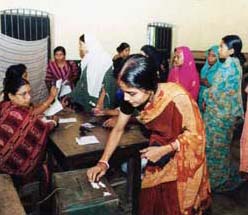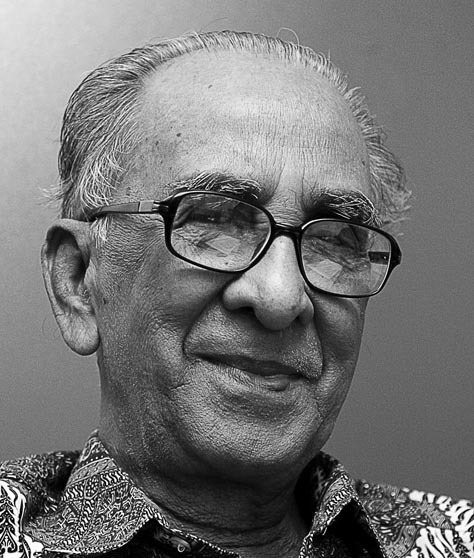|
General Elections In Bangladesh
General elections are held in Bangladesh to elect members of the Jatiya Sangsad, the unicameral national parliament. The Jatiya Sangsad consists of 300 members elected by first-past-the-post voting in single-member constituencies and 50 seats reserved for women, which are allocated based on the proportional vote share received by parties. Elections are overseen by the Bangladesh Election Commission. First general election The first general elections were held in Bangladesh on 7 March 1973. The Awami League won the elections and secured 293 seats out of 300 where eleven members of the Jatiya Sangsad won freely without votes. 1091 candidates from 14 parties contested in this election. The total vote was 53.54%. Second general election The second general elections were held in Bangladesh on 18 February 1979, under President Ziaur Rahman. The Bangladesh Nationalist Party won the election; They won 207 out of 300 seats in the Jatiya Sangsad.The total vote was 51.2%। In this el ... [...More Info...] [...Related Items...] OR: [Wikipedia] [Google] [Baidu] |
Jatiya Sangsad
The Jatiya Sangsad (), often simply referred to as Sangsad and also known as is the unicameral Legislature, legislative body of Bangladesh. The current parliament of Bangladesh contains 350 seats, including 50 seats reserved exclusively for women. Elected occupants are called Member of Parliament (Bangladesh), members of Parliament, or MPs. The 2024 Bangladeshi general election, 12th national parliamentary election was held on 7 January 2024. Elections to the body are held every five years, unless a parliament is dissolved earlier by the President of Bangladesh. On 6 August 2024, President Mohammed Shahabuddin dissolved parliament after the resignation of Sheikh Hasina and ordered to form an 2024 Bangladesh Interim Government, interim government. The leader of the party (or alliance of parties) holding the majority of seats becomes the Prime Minister of Bangladesh, and so the Head of government, head of the government. The President of Bangladesh, the ceremonial head of state, ... [...More Info...] [...Related Items...] OR: [Wikipedia] [Google] [Baidu] |
Khaleda Zia
Begum Khaleda Zia (born August–September 1945) is a Bangladeshi politician who served as the prime minister of Bangladesh from 1991 to 1996 and again from 2001 to 2006. She was the first female prime minister of Bangladesh and the second female prime minister in the Muslim world, after Benazir Bhutto. She is the widow of former president of Bangladesh, president of Bangladesh and army commander, Ziaur Rahman. She has been the chairperson and leader of the Bangladesh Nationalist Party (BNP) since 1984, which was founded by her husband, Zia, in 1978. Khaleda came to national attention as the First Lady of Bangladesh after her husband, Rahman, became the president in 1977. After Assassination of Ziaur Rahman, Rahman's assassination in 1981, Khaleda joined politics and came to lead BNP. After 1982 Bangladesh coup d'état, a military coup in 1982, she helped lead the movement for democracy. She became the prime minister following the victory of BNP in 1991 Bangladeshi general elect ... [...More Info...] [...Related Items...] OR: [Wikipedia] [Google] [Baidu] |
List Of Constituencies Of The Jatiya Sangsad
This is a list of 300 parliamentary constituencies currently represented in the Jatiya Sangsad, the unicameral national legislature of Bangladesh. Each constituency is represented by a single Member of Parliament. The Jatiya Sangsad of Bangladesh consists of 350 seats, of which 50 seats are reserved for women, who are elected by the 300 directly elected members on the basis of procedure of proportional representation in the Parliament through single transferable vote. The Bangladesh Election Commission is made responsible to "delimit the constituencies for the purpose of elections to Parliament" by the Constitution of Bangladesh (chapter VII, article 119). It also says, "There shall be one electoral roll for each constituency for the purposes of elections to Parliament, and no special electoral roll shall be prepared so as to classify electors according to religion, race caste or sex" (article 121). The current list, published by the Bangladesh Election Commission in 2018 as p ... [...More Info...] [...Related Items...] OR: [Wikipedia] [Google] [Baidu] |
Independent Candidates
An independent politician or non-affiliated politician is a politician not affiliated with any political party or bureaucratic association. There are numerous reasons why someone may stand for office as an independent. Some politicians have political views that do not align with the platforms of any political party and therefore they choose not to affiliate with them. Some independent politicians may be associated with a party, perhaps as former members of it or else have views that align with it, but choose not to stand in its name, or are unable to do so because the party in question has selected another candidate. Others may belong to or support a political party at the national level but believe they should not formally represent it (and thus be subject to its policies) at another level. In some cases, a politician may be a member of an unregistered party and therefore officially recognised as an independent. Officeholders may become independents after losing or repudiating af ... [...More Info...] [...Related Items...] OR: [Wikipedia] [Google] [Baidu] |
Elections In Bangladesh
Bangladesh elects on national level a legislature with one house or chamber. The unicameral Jatiyo Sangshad, meaning national parliament, has 350 members of which 300 members are directly elected through a national election for a five-year term in single-seat constituencies while 50 memberships are reserved for the women who are selected by the ruling party or coalition. The Prime Minister is the head of the government. The president who is the head of the state is elected by the National Parliament. The president of Bangladesh is a ceremonial post and does not exercise any control over the running of the state. Prior to the 2024 Bangladesh constitutional crisis, the country had a two-party system that had evolved over time since the election of 1991. Two political parties or coalitions dominated, one headed by Bangladesh Awami League and the other by Bangladesh Nationalist Party, making it difficult for anybody to achieve electoral success under the banner of any other party. ... [...More Info...] [...Related Items...] OR: [Wikipedia] [Google] [Baidu] |
Chief Adviser Of Bangladesh
The Chief Adviser of Bangladesh (), officially Chief Adviser of the People's Republic of Bangladesh (), is the chief executive of the Caretaker government of Bangladesh, caretaker and the Interim government system of Bangladesh, interim government of Bangladesh, who serves as the head of government during the transition period between one Elections in Bangladesh, elected government and another. With powers roughly equivalent to those of the Prime Minister of Bangladesh, prime minister of an elected government, their executive power is limited by Constitution of Bangladesh, the constitution. The chief adviser leads an advisory committee comprising several Adviser (Bangladesh), advisers (equivalent to a minister), all of them selected from among politically neutral individuals to be acceptable to all major political parties. The office of the chief adviser is called Chief Adviser's Office. History The caretaker government system of Bangladesh was introduced in March 1996 through ... [...More Info...] [...Related Items...] OR: [Wikipedia] [Google] [Baidu] |
Fakhruddin Ahmed
Fakhruddin Ahmed (; born 1 May 1940) is a Bangladeshi economist, civil servant, and a former governor of the Bangladesh Bank, the country's central bank. He also served as the 4th Chief Adviser of Caretaker government of Bangladesh. On 12 January 2007, he was appointed Chief Adviser (head of the government) of the non-political caretaker government, during the 2006–2008 Bangladeshi political crisis. He remained in that position for nearly two years, exceeding the customary tenure, until the elections were held on 29 December 2008. Early life and career Ahmed was born on 1 May 1940 in Rob Nagorkandi, Tongibari, Munshiganj to Mohiuddin Ahmed. He studied economics at Dhaka University, where he obtained his BA (Hons) and MA in 1960 and 1961, respectively, standing first in his class both times. He earned a master's degree in development economics from Williams College and a Ph.D. in economics from Princeton University in 1975. His doctoral dissertation was titled "Migrat ... [...More Info...] [...Related Items...] OR: [Wikipedia] [Google] [Baidu] |
Latifur Rahman
Latifur Rahman (1 March 1936 – 6 June 2017) was the 10th chief justice and the 2nd chief adviser of Bangladesh. Early life and education Latifur Rahman was born in Jessore on 1 March 1936. His father was the lawyer Khan Bahadur Lutfur Rahman. His maternal uncle Nurul Huda served as a High Court judge. He earned his master's in English literature at the University of Dhaka in 1956 and later completed his bachelor's in law from the same university. He served as a faculty member of Shahid Suhrawardy College. Career Latifur Rahman started his lawyer career with the Dhaka High Court membership in 1960. He was an apprentice to Bangladesh's first attorney general In most common law jurisdictions, the attorney general (: attorneys general) or attorney-general (AG or Atty.-Gen) is the main legal advisor to the government. In some jurisdictions, attorneys general also have executive responsibility for law enf ... MH Khandaker. He became a permanent High Court judge in 1981 and an Ap ... [...More Info...] [...Related Items...] OR: [Wikipedia] [Google] [Baidu] |
BBC Bangla
BBC Bangla () is the Bengali language service of the BBC World Service, inaugurated in 1941 for Bengali audiences worldwide especially the ones in the Bengal region, which includes the sovereign state of Bangladesh and the Indian states of West Bengal and Tripura. History BBC Bangla was launched on 11 October 1941 with a 15-minute programme under the BBC World Service. BBC Bangla's headquarters used to be Bush House, but since 2012, it has been broadcast from Broadcasting House in London as well as from BBC bureaux in Dhaka and Kolkata. In September 2022, BBC Bangla announced its cessation of radio broadcasts due to financial reasons. On 31 December 2022, BBC Bangla officially ceased broadcasting on radio after eighty-one years of service, following the ''Parikrama'' program. Despite this, it continued its existence on television and the internet. Broadcasting The programmes of BBC Bangla are broadcast on FM radio, mediumwave and shortwave, their website and their internet rad ... [...More Info...] [...Related Items...] OR: [Wikipedia] [Google] [Baidu] |
Sheikh Hasina
Sheikh Hasina (''née'' Wazed; born 28 September 1947) is a Bangladeshi politician who served as the tenth prime minister of Bangladesh from June 1996 to July 2001 and again from January 2009 to August 2024. Premiership of Sheikh Hasina, Her second term in office, which critics characterized as a dictatorship, ended in self-imposed exile following the July Revolution (Bangladesh), July Revolution in 2024. Hasina is the daughter of Sheikh Mujibur Rahman, Bangladesh's President of Bangladesh, founding president, and is a member of the Tungipara Sheikh family, Tungipara Sheikh political family. She had little presence in politics before Assassination of Sheikh Mujibur Rahman, her father's assassination in August 1975. Afterwards, she took asylum in India and became involved with the Awami League and was elected as its president, a position which she continues to hold to this day while residing in India. After returning to Bangladesh in 1981, she and her party Awami League became ... [...More Info...] [...Related Items...] OR: [Wikipedia] [Google] [Baidu] |






